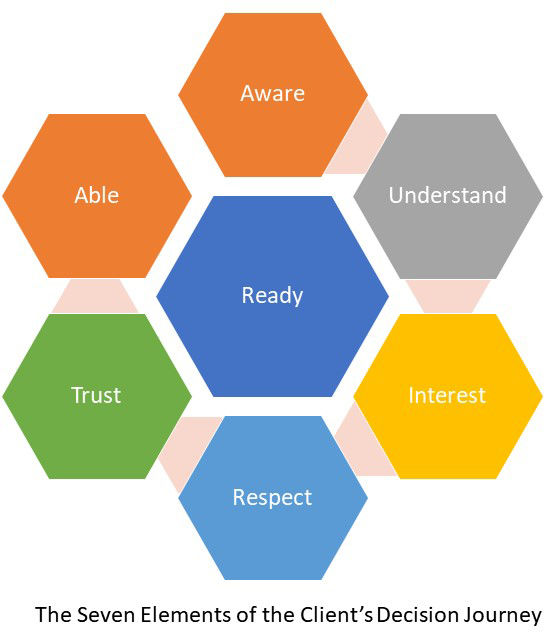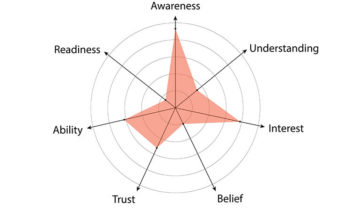The Seven Elements of Business Development for Professional Services
A Set of Conditions
The Seven Elements is a set of conditions that must be present in order for a prospective client to buy your services:

- Prospective clients must, of course, become aware of your existence.
- They must understand what you do and how you are unique.
- Prospects must develop an interest in you and your firm. Your services must be relevant to their goals.
- They must respect your work and be confident in your ability to do what you say you can do.
- Potential clients must trust you to have their best interests at heart.
- They must have the ability to engage you, which means they have sufficient authority, budget, and organizational support.
- A prospective client must be ready to act. The timing has to be right. Sometimes all other conditions are met but some other priority supersedes.
Not a Linear Process
The buying process for professional services and consulting isn’t linear. You can’t drive prospects through a funnel. The dynamics of each prospect’s buying journey will be unique.
However, you can anticipate your prospective clients’ buying needs and take actions that facilitate their buying.
- What can you do to make prospective clients aware of your firm? How might you stay in touch and add value over time to help ensure you remain top of mind?
- How might you sharpen your messaging to make it easier for prospective clients to understand what you do and how you are different? Are you making it easy for champions to explain to others what you do? Alternatively, are you guilty of being intentionally vague about your core capabilities?
- Have you done your homework to understand your prospective client’s needs and priorities? Have you made an honest assessment of your capacity to help them achieve a material objective?
- Have you provided objective proof of your capabilities? What testimonials, referrals, case studies, and guarantees can you offer?
- How might you demonstrate through words and actions that you place your prospective client’s interests above your own? Do you lead with value without expectation, or do you take a narrow, transactional approach to the relationship? You can’t earn trust in the sense that you can’t demand trust. But, you can demonstrate you are worthy of trust.
- Are you clear about how your prospective client makes budgeting and buying decisions? How might you support an advocate in her efforts to gain the support of her colleagues?
- How might you stay on top of the dynamics that can shift a prospective client’s priorities? If all other preconditions have been met, how are you staying in touch so you’ll be there when the timing is right?
Honest Self-assessment Pays
If our role in a firm is marketing, there may be a tendency for us to rate others’ awareness and understanding of our services highly. On the other hand, if we are primarily focused on business development, we may tend to rate the trust and respect felt by others as being high. Nevertheless, we probably have weaknesses that could be our undoing.
After all, it’s insufficient for a client to reach six of seven thresholds. A prospective client might be very aware of you, understand your services, respective your capabilities, have an important and pressing need and have the budget. If they don’t trust you sufficiently, you’re unlikely to get the gig. So, continuous and honest self-assessment is required to identify and rectify deficiencies. Cultivating The Seven Elements is a discipline and practice rather than a campaign.




